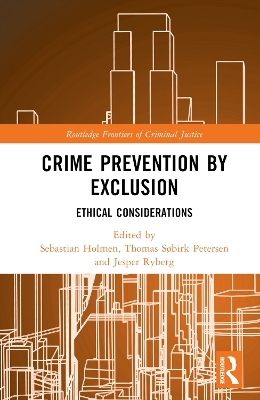
Crime Prevention by Exclusion
Routledge (Verlag)
978-1-032-76971-4 (ISBN)
This volume brings together world-leading experts in ethics and penal theory to answer controversial questions about the ethics of preventing crime by exclusion. Situational crime prevention measures—such as gated communities, hostile design, or annoying music or noise—intended to exclude some or all people from an area to prevent crime present important ethical questions. Is the use of exclusionary measures antithetical to the attainment of social justice or to addressing the root causes of crime? If such measures result merely in the displacement of crime, does this mean they are without value, or morally questionable? What are the conceptual relationships between exclusionary measures, civic trust, and moral agency? Do some or all exclusionary measures fail to respect potential offenders as rational agents? When, if ever, is the use of exclusion to prevent crime discriminatory? And do such measures have a morally problematic expressive dimension?
This book is invaluable for scholars with an interest in crime prevention, criminal law, and criminal justice. The practical implications will also appeal to practitioners in the criminal justice system involved in the implementation and administration of preventive exclusion.
Sebastian Jon Holmen is Postdoctoral Fellow at Roskilde University. He works on the research project SITE (Situational Crime Prevention and Ethics) supported by the Independent Research Fund Denmark. Holmen has published in philosophical journals, including Criminal Law and Philosophy, Criminal Justice Ethics, Res Publica, Philosophia, Ethical Theory and Moral Practice, the Journal of Medical Ethics, Neuroethics, and the Journal of Cognition and Neuroethics. Thomas Søbirk Petersen is Professor of Bioethics and Criminal Justice Ethics at Roskilde University. He is the PI of the research project SITE (Situational Crime Prevention and Ethics) supported by the Independent Research Fund Denmark. Petersen has published in philosophical journals, including AI and Ethics, Bioethics, Criminal Law and Philosophy, Drugs: Education, Prevention and Policy, Ethical Theory and Moral Practice, Neuroethics, the Journal of Business Ethics, the Journal of Ethics, the Journal of Global Ethics, the Journal of Medical Ethics, the Journal of the Philosophy of Sport, the International Journal of Law and Psychiatry, Res Publica, and Theoria. Jesper Ryberg is Professor of Ethics and Philosophy of Law, at Roskilde University and Head of the Research Group for Criminal Justice Ethics. He has published in philosophical journals, including Criminal Law and Philosophy, Philosophical Papers, Theoria, The Philosophical Quarterly, Res Publica, Ethical Theory and Moral Practice, the Journal of Applied Philosophy, Social Theory and Practice, the Journal of Medical Ethics, the Journal of Ethics, Neuroethics, Analysis, and Utilitas.
Introduction: Crime Prevention by Exclusion: Setting the Scene
Sebastian Jon Holmen, Thomas Søbirk Petersen and Jesper Ryberg
1 Assessing exclusionary modes of crime reduction
Zachary Hoskins
2 Crime distribution and state obligations
Jesper Ryberg
3 The wrongness of preventive exclusion
David Birks
4 ‘A disproportionate and degrading approach that acts without discrimination’? The expressive dimension of exclusionary crime prevention techniques
Christopher Bennett
5 Homelessness, poverty, and the limits of preventive exclusion
Terry Skolnik
6 Situational crime prevention or getting to the root causes of crime?
Thomas Søbirk Petersen
7 Gated communities, social exclusion, and the right to basic security
Richard L. Lippke
8 Gated communities and discrimination against the poor
Kasper Lippert-Rasmussen
9 Out of sight, out of mind: Is the state justified in using selective exclusion as punishment?
Katrina L. Sifferd
10 The ethics and politics of nudges and niches: A critical analysis of exclusionary environmental designs
Lucy Osler, Bart Engelen, and Alfred Archer
11 Homelessness and the use of music in crime prevention
Hadessa Noorda
12 ‘Hanging out and sleeping on the ground’: Acoustic environments, rationality, and the minimal account of Permissible means of prime prevention
Sebastian Jon Holmen
| Erscheinungsdatum | 18.09.2024 |
|---|---|
| Reihe/Serie | Routledge Frontiers of Criminal Justice |
| Verlagsort | London |
| Sprache | englisch |
| Maße | 152 x 229 mm |
| Gewicht | 635 g |
| Themenwelt | Sachbuch/Ratgeber ► Gesundheit / Leben / Psychologie |
| Geisteswissenschaften ► Philosophie ► Ethik | |
| Recht / Steuern ► Strafrecht ► Kriminologie | |
| Sozialwissenschaften ► Pädagogik ► Sozialpädagogik | |
| Sozialwissenschaften ► Soziologie | |
| ISBN-10 | 1-032-76971-8 / 1032769718 |
| ISBN-13 | 978-1-032-76971-4 / 9781032769714 |
| Zustand | Neuware |
| Informationen gemäß Produktsicherheitsverordnung (GPSR) | |
| Haben Sie eine Frage zum Produkt? |
aus dem Bereich


